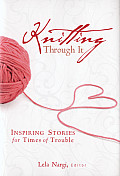Lela Nargi, editor
 A colleague brought in Knitting Through It for my knitting coworker and I to read. I was eager to read it because the topic seemed like the perfect fit for a new year full of upheaval. Using knitting, the process of knitting, to "see us through adversity" (13) is something to which I can most definitely relate and I thought reading about others doing the same might be cathartic. Unfortunately, Knitting Through It was a disappointment.
A colleague brought in Knitting Through It for my knitting coworker and I to read. I was eager to read it because the topic seemed like the perfect fit for a new year full of upheaval. Using knitting, the process of knitting, to "see us through adversity" (13) is something to which I can most definitely relate and I thought reading about others doing the same might be cathartic. Unfortunately, Knitting Through It was a disappointment. Knitting Through It is a short-story collection arranged topically--Knitting through... Charity, Illness, Smoke, Grief, Work, Unemployment, Politics, Prison, War, Poverty, Industrial Development, Families in Motion, Relationships. Contemporary writing is supplemented by life stories collected in the 1930s and 1940s,1 as well as patterns and photographs (mostly historical). While the structure should work in theory, in practice Knitting Through It reads more like the contents of someone's idea file than of a curated collection. For example, "Knitting through Prison" (pages 101-113) consists of an excerpt from an interview that mentions a "profitable little trading business" that the interviewee's father had developed while in prison using handknits sent by his wife as initial stock, a story about a prison reform program crochet project, a photograph of an art installation featuring hats created during the course of the aforementioned program, a pattern for the simple crocheted hats the prisoners made, a photograph depicting Sing Sing prisoners knitting circa 1915, and a three-quarter page blurb about the "behind-bars craft tradition".
To be blunt, I feel like this collection needed editing. The most interesting aspect of the book is the inclusion of tidbits from the Works Progress Administration (WPA) Federal Writers' Project records, but they don't always seem to fit well into the chapter themes. And, even though their inclusion seems to have been a key part of the plan for the collection as a whole, the decision wasn't made to focus the collection on the American experience. I find this problematic only because the collection (especially with the inclusion of all the WPA-collected life stories) is so heavily American that the occasional international inclusion seems completely out of place.
- From the Works Progress Administration (WPA) Federal Writers' Project records, circa 1935-1942, housed at the Library of Congress.

I just may take a peek at it just for the WPA-related stuff.
ReplyDelete